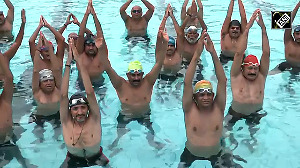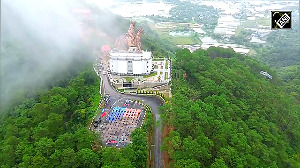Indian negotiators and International Atomic Energy Agency officials will meet shortly in Vienna to iron out the differences in readying the 'agreed text' on India-specific safeguards, which is crucial to operationalise the India-United States nuclear deal.
So far, four rounds have taken place since November 2007 for readying the text, which has been stuck on certain wordings on the uninterrupted supply of fuel for civilian nuclear plants and on the corrective measures in the event of stoppage of fuel, sources said.
The 'agreed text' was to be ready by the third round of talks during the first week of January but spilled over to the fourth round in mid-January, but remained inconclusive because of the differences in wordings.
IAEA spokesperson from Vienna in a communication told PTI, "Negotiations are continuing and the next meeting is expected shortly".
Indian officials said the stress was on appropriate wordings to satisfy the agency on fuel supplies and corrective measures. Therefore, the negotiating team from India for the forthcoming meeting will include senior official Venkatesh Verma from the Ministry of External Affairs.
New Delhi is hopeful of completing the exercise for readying the 'agreed text' during this round of talks so that it would provide enough time for the 35-member IAEA board of governors to study it for approval.
According to sources, the board of governors was planning to insist on a five-week review of the completed safeguards agreement prior to making a decision on its approval, so that it does not leave enough time before the regular five-day board meeting which begins on March 3.
If the two negotiating parties do not come to any conclusion, then the board may take up the matter during its routine meeting in June, sources added.
Meanwhile, there are differing views on the 45-member Nuclear Suppliers Group's eagerness to finish consultations to give exemptions to India by March.
Even countries like New Zealand and Switzerland, which had been resisting the move, had come around and softened their stand and, in fact, were working towards making a written draft on the exemption to enable trade in nuclear material and technology with India.
It is learnt that New Zealand and Switzerland may be putting some requirements for additional protocol to supplement the 123 agreement for NSG consideration.
Sources also said that the NSG draft would not be finalised until the 'non-paper' is informally circulated among the pro-NPT (nuclear non-proliferation treaty) lobby that includes Ireland, the Netherlands and Australia.
The next NSG plenary meeting is scheduled for May, but the group could meet in a special session to consider the Indian exemption issue before that, sources said.
The NSG had considered the draft US-India agreement (123 agreement) for civil nuclear cooperation, which was presented to the group by the US in September 2007.
In January, the NSG had its first round of talks and were optimistic about completing the process of giving a waiver to India without much opposition before March, sources said.
The draft paper on exemption to India by the NSG was a crucial step towards operationalisation of the Indo-US deal, and to move forward with similar agreements with France and Russia.
Only when the IAEA prepares a final agreed text, which has to be cleared by its board of governors, can the US could go ahead with its talks with the 45-member nuclear suppliers group to get a clean and unconditional exemption for India to do nuclear commerce internationally.
The Indian negotiators also have to satisfy the United Progessive Alliance-Left committee before readying the agreed text.
Once the IAEA 'agreed text' and the draft on the waiver for India by the NSG is ready, they have to be finally approved by the US Congress.
Currently, the US lawmakers and politicians are silent on the issue due to hectic campaigning for the next presidential elections.






